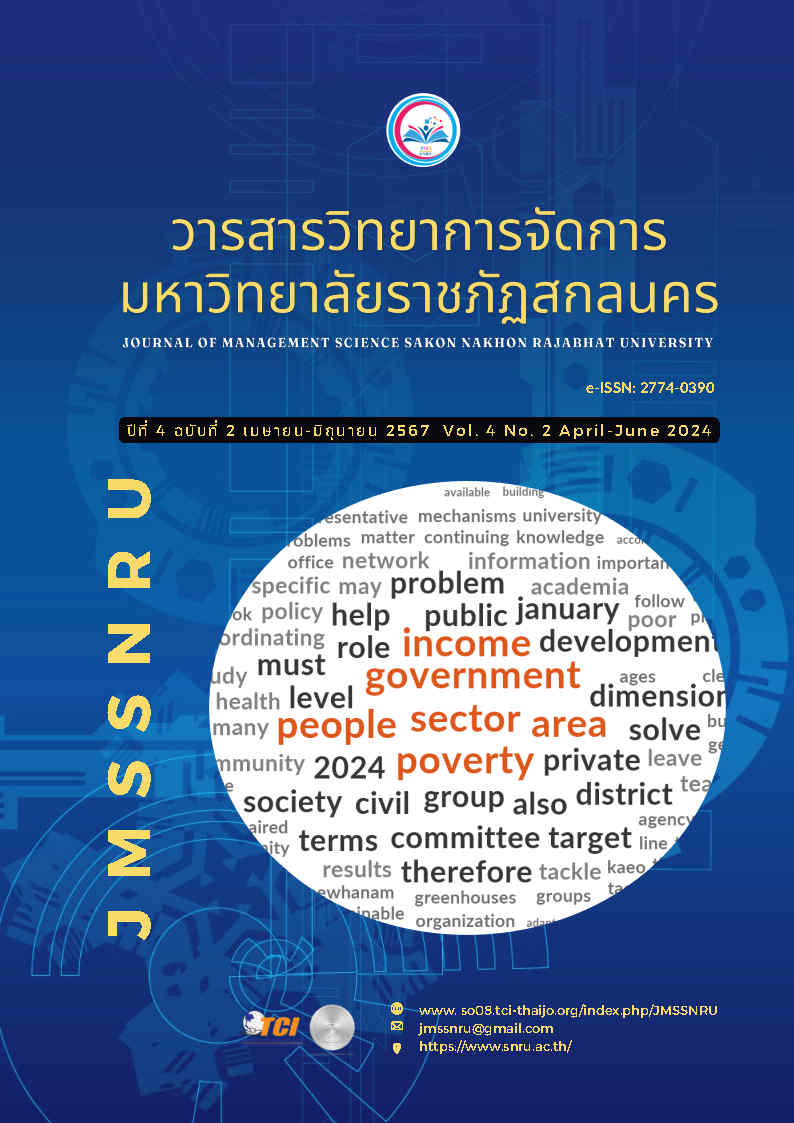SOCIAL ENTREPRENEURIAL INTENTIONS OF UNDERGRADUATE STUDENTS, KASEM BUNDIT UNIVERSITY: AN ANALYSIS BASED ON EDUCATION, PASSION, MORAL INTELLIGENCE AND PSYCHOLOGICAL CAPITAL
Keywords:
social entrepreneurial education, entrepreneurial psychological capital, entrepreneurial passion, moral intelligence, social entrepreneurial intentionsAbstract
The study aimed to identify variables influencing undergraduates' social entrepreneurship intentions. This study took into account the four main contextual aspects, including social entrepreneurial education, entrepreneurial passion, moral intelligence, and entrepreneurial psychological capital. The study involved 9,035 undergraduate students from Kasem Bundit University, with a sample of 400 participants selected through stratified random sampling for a self-administered questionnaires survey. Multiple regression analysis and descriptive statistics were also used to analyze the quantitative data. The result showed that all independent variables had a significant influence on the dependent variable. The multiple regression model indicated that social entrepreneurial education contributed most to the intention of social entrepreneurs with the regression coefficient was 0.357 and the adjusted coefficient of determination equals 0.627. It can be concluded that social entrepreneurial education, entrepreneurial psychological capital, moral intelligence, and entrepreneurial passion explained as much as 62.7% of the factors that influence social entrepreneurial intention.
References
Bacq, S., & Alt, E. (2018). Feeling capable and valued: A prosocial perspective on the link between empathy and social entrepreneurial intentions. Journal of Business Venturing, 33(3), 333-350.
Cardon, M. S., Gregoire, D. A., Stevens, C. E., & Patel, P. C. (2013). Measuring entrepreneurial passion: Conceptual foundations and scale validation. Journal of Business Venturing, 28(3), 373–396.
Dhiramitr, S., Pratoom, K., & Savatsomboon, G. (2022). Quotient factors affecting job success of personnel of provincial commercial officer in Thailand. Journal of Modern Learning Development, 7(2), 120–134.
Fatoki, O. (2018). Determinants of Social Entrepreneurial intentions of university students in South Africa. Journal of Economics and Behavioral Studies, 10(6A), 72–80.
Hassan, H. M. K., Igel, B., & Shamsuddoha, M. (2022). Entrepreneurship education and social entrepreneurial intentions: The mediating effects of entrepreneurial social network. Retrieved May 23, 2023 from https://www.ncbi.nlm.nih.gov/pmc/articles/PMC9150754/pdf/fpsyg-13-860273.pdf.
Hobfoll, S. E. (2002). Social and psychological resources and adaptation. Review of General Psychology, 6, 307–324.
Huyghe, A., Knockaert, M., & Obschonka, M. (2016). Unraveling the “passion orchestra” in academia. Journal of Business Venturing, 31(3), 344–364.
Keat, O. Y., Selvarajah, C., & Meyer, D. (2011). Inclination towards entrepreneurship among university students: An empirical study of Malaysian university students. International Journal of Business and Social Science, 2(4), 206–220.
Khattiya, S., & Pomlaktong, N. (2019). Social Enterprises and Sustainable Aational Development. Journal of Management Science Review, 21(1), 145–154.
Kibler, E., & Kautonen, T. (2016). The moral legitimacy of entrepreneurs: An analysis of early-stage entrepreneurship across 26 countries. International Small Business Journal, 34(1), 34–50.
Kuehn, K. W. (2008). Entrepreneurial intentions research: Implications for Entrepreneurship education. Journal of Entrepreneurship Education, 11, 87–98.
Liñán, F., & Chen, Y. (2009). Development and Cross–cultural application of a specific instrument to measure entrepreneurial intentions. Entrepreneurship theory and practice, 33, 593–617.
Luthans, F., Avolio, B. J., Avey, J. B., & Norman, S. M. (2010). Positive psychological capital: Measurement and relationship with performance and satisfaction. Journal of Personnel Psychology, 60, 541–572.
Luthans, F., Youssef, C. M., & Avolio, B. J. (2007). Psychological capital: Developing the human competitive edge. New York: Oxford University Press.
Mahfud. T., Triyono, M. B., Sudira, P., & Mulyani, Y. (2020). The influence of social capital and entrepreneurial attitude orientation on entrepreneurial intentions: the mediating role of psychological capital. European Research on Management and Business Economics, 26(1), 33–39.
National Statistical Office. (2022). Labor Force Survey, 1st Quarter 2021. Retrieved May 1, 2023 from http://www.nso.go.th/ sites/2014en/Survey/social/labour/LaborForce/2021/summary1_64.pdf
Naveed, M., Zia, M. Q., Younis, S., & Shah, Z. A. (2021). Relationship of individual social entrepreneurial orientations and intentions: Role of social entrepreneurship education. Asia Pacific Journal of Innovation and Entrepreneurship, 15(1), 39–50.
Newbold, K. F., & Erwin, T. D. (2014). The education of entrepreneurs: An instrument to measure entrepreneurial development. Journal of Business and Entrepreneurship, 26(1), 141–178.
Solomon, G. T., Alabduljader, N., & Ramani, R. S. (2019). Knowledge management and social entrepreneurship education: Lessons learned from an exploratory two-country study. Journal of Knowledge Management, 23(10), 1984–2006.
Vallerand, R. J., Blanchard, C., Mageau, G. A., Koestner, R., Ratelle, C., Léonard, M., Gagné, M., & Marsolais, J. (2003). Les passions de l’ame: On obsessive and harmonious passion. Journal of Personality and Social Psychology, 85(4), 756–767.
Voda, A. I., & Florea, N. (2019). Impact of personality traits and entrepreneurship education on entrepreneurial intentions of business and engineering students. Sustainability, 11, 1–34.
Walter, S. G., & Block, J. (2016). Outcomes of entrepreneurship education: An institutional perspective. Journal of Business Venturing, 31(2), 216–233.
Wennekers, S., Van Wennekers, A., Thurik, R., & Reynolds, L. (2005). Nascent Entrepreneurship and the Level of Economic Development. Small Business Economics, 24, 293-309.
Wongrattana, C. (2012). Techniques for using statistics for research. Bangkok: Thepnaramit Printing.
Wang, Z., Li, J., & Yuan, D. (2017). The Impact of Social Capital on Opportunity Recognition of Social Entrepreneurs. Journal of China University of Geosciences (Social Sciences Edition), 17, 140-149.
Wang, A., & Yee, C. (2023). A Literature Review of Social Entrepreneurship. Open Journal of Business and Management, 11, 2232-2246.
Downloads
Published
How to Cite
Issue
Section
License
Copyright (c) 2024 JOURNAL OF MANAGEMENT SCIENCE SAKON NAKHON RAJABHAT UNIVERSITY

This work is licensed under a Creative Commons Attribution-NonCommercial 4.0 International License.
An article published in the Journal of Management Science. Sakon Nakhon Rajabhat University is the opinion, copyright and responsibility of the author of the work.







